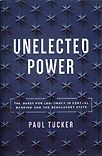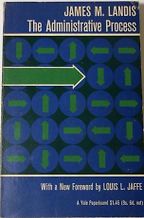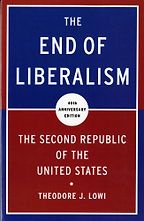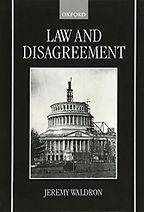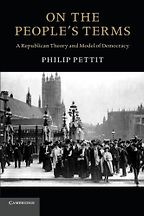In your book, you place what you call the “administrative state” at the heart of the political dilemmas facing the liberal political order. Could you tell us what you mean by ‘the administrative state’ and the dilemmas it poses for democratic societies?
This is about the legitimacy of the structure of government that has developed in Western democracies. The ‘administrative state’ is simply the machinery for implementing policy and law. What matters is that much of it—including many regulators and central banks—is no longer under direct ministerial control. They are not part of a ministerial department. They are not answerable day-to-day, minute-by-minute to the prime minister or, in other countries, the president.
When I was young, in Europe at least, these arm’s-length agencies were a small part of government, but now they are a very big part. Over here, that transformation has come about over the past thirty-odd years, since the 1990s, whereas in America it goes back to the 1880s, and especially the 1930s New Deal reforms of President Roosevelt.
“The ‘administrative state’ is simply the machinery for implementing policy and law. ”
In the United Kingdom we used to call these agencies ‘quangos’, but that acronym trivialises the issue. Today, many—in the US, probably most—of the laws to which businesses and even individuals are subject are written and enforced by regulatory agencies, part of the administrative state, rather than passed by Parliament or Congress and enforced by the elected executive. That would surprise John Locke, Montesquieu and James Madison, who developed the principles associated with the separation of powers and constitutionalism.
To some extent, these changes were driven by a perceived need to turn to ‘expertise’. But the effect has been to shift more of our government away from our elected representatives and to unelected technocrats. An underlying premise at the heart of my book (although not something that I can prove) is that, since any and every part of government eventually fails—and may fail very badly, as we saw with the collapse of the financial system in 2008—there is a risk that people will get fed up with this shift to governance by unelected experts. The people will get fed up with their lives being affected so much by people who they didn’t have a chance to vote for and can’t vote out. If that happened, it would be dangerous as the genius of representative democracy is that it separates how we as citizens feel about the system of government from how we feel about the government of the day. So how can we avoid that without losing the benefits of delegation? That is what the debate about the administrative state is ultimately about: its dryness belies its importance to how we govern ourselves.
“The genius of representative democracy is that it separates how we as citizens feel about the system of government from how we feel about the government of the day”
It matters, therefore, that the array of agencies in the administrative state varies enormously in the degree to which they are formally insulated from politics. My book Unelected Power is about ‘independent agencies’, by which I mean an agency that is insulated day-to-day from both the legislative branch (Parliament or Congress) and also from the executive branch of government (the prime minister or president). Central banks are the most important example of such independent agencies in modern times, wielding a wide range of monetary and regulatory powers.
The first book you’ve chosen is The Administrative Process by James M. Landis, written in 1938. I think he was actually a member of one of these agencies: the SEC (Securities and Exchange Commission) in the U S. The book is a defence of independent agencies, right?
That’s exactly right. Landis is one of the high priests of the administrative state as it developed in the United States during the New Deal under President Roosevelt. He was a commissioner at the Federal Trade Commission, which is the competition authority in America. He was one of the architects of the Securities and Exchange Commission, and I think chair it for a while. Later, in the 1960s, he was an advisor to incoming President Kennedy on all of these things. For a while, he was the Dean of the Harvard Law School, but his career unravelled as a result of various personal disasters.
“That is what the debate about the administrative state is ultimately about: its dryness belies its importance to how we govern ourselves.”
In the mid-30s he wrote this book, which was, in a sense, the manifesto of the administrative state. It’s a book I suspect is not terribly well known outside of America, but ought to be. It captures a number of the main themes of the debate that continues to this day. At the heart of Landis’ argument is the idea that the economy and society have become a lot more complicated: that expertise capable of comprehending that complexity therefore matters above all else, but that we can’t expect our elected representatives to have the necessary expertise. Part and parcel with that, he envisages regulatory bodies which make policy, write rules, investigate compliance with those rules, and adjudicate enforcement measures. That, of course, looks like a complete violation of the doctrine of the separation of powers.
Get the weekly Five Books newsletter
In other words, he seems to advocate a system of regulatory agencies that almost sweeps away the standard separation of powers between legislature, executive and judiciary because, somehow, he sees that as outdated. Instead, you need to divide government by subject matter: competition policy, labour market policy, capital markets, monetary policy, and so on. Each subject would have a specialist agency responsible for (more or less) everything in that field, with decisions made by a group of commissioners: hence the Securities and Exchange Commission, Federal Trade Commission, Commodities and Futures Trading Commission, and so on.
Was he aware that he was compromising the separation of powers in what he was advocating? And was he aware of some of the pitfalls, or did he see this largely as an entirely benign development?
At that stage, in the 1930s and 40s, I think he regarded it as largely benevolent. Nor did he pay much attention to the prospect of capture by industries. Later, when he was advising president-elect Kennedy, he changed tack. He concluded that these agencies should be led by a single head to give them greater dynamism, and that the single head ought to be closer to the president, so that the president can coordinate policy across the various agencies. That’s a rather different vision. Again, I think he didn’t foresee the pitfalls. In a sense, much of the subsequent debate about the administrative state, and about even about central banks, revolves around finding problems with Landis’ vision.
That brings us quite neatly on to the next book, The End of Liberalism by Theodore Lowi. Does this book suggest that the central characteristics of liberal government have been undermined by the role of the administrative state?
That’s right. Theodore Lowi was a political scientist in the United States. He published two versions of this book, one in 1969 and one in 1979. The subtitle of the second edition is called ‘The Second Republic of the United States’. What he wants to argue is that the old liberalism of the nineteenth century has been transplanted by a new liberalism—Landis’ New Deal new liberalism—and he hates it. I want to quote a couple of sentences: “Policy without law is what a broad delegation of power is.” Elsewhere, he writes “a government of statutes without standards may produce pluralism but it is a pluralism of privilege and tight access.”
He’s arguing that there are big problems with Congress and parliaments passing laws with vague delegations that just hand over the power to decide high policy to unelected technocrats—regulators—who then consult the various interest groups in society. He claims that that is just a battle of power, with policy and other outcomes turning on who has the greatest lobbying power. He wants to get back to a world in which the legislature—the people that we’ve elected—debates the common interest. And, yes, they might delegate to technocrats, but they should not delegate on the basis of a vague mandate. Those themes are absolutely central to my book.
The next book is Giandomenico Majone’s Dilemmas of European Integration. How does he address these dilemmas from a European perspective?
Majone is probably Europe’s best thinker on these issues. He is neglected in the United States, to their cost I think. Although Dilemmas is partly about Europe, this book also usefully summarises the account Majone developed in earlier work of the warrant for delegation to technocrats. He distinguishes very helpfully between two types of delegation. One is to an agency that is literally the political principal’s agent, whose job is to do what the elected politician wants done but doesn’t have the time or technical expertise to do him or herself. So if the politician has set the agent a vague mandate, the agent must consult back on what the politician wants them to do or, if they can’t do that, the agent has a duty to make a judgment about what their political boss would want them to do. The risk here is that, rather than faithfully sticking to their duty, the agent may wander off the ranch, pursuing either their own self-interest or their own view of the public interest.
Five Books interviews are expensive to produce. If you're enjoying this interview, please support us by donating a small amount.
Obviously that is not a model for an independent agency at all, because their leaders are not meant to keep going back to their political principal. The other type of delegation Majone describes is quite different, involving what he calls is a fiduciary relationship (and in my book I call them “trustees”). The idea is that the elected politicians want to commit to a particular policy but, as elected politicians, they can’t be trusted to stick to that objective themselves because the imperative of being re-elected, of being more popular than the opposition political party, will always dominate in the short-run. So instead the politicians appoint somebody who is obliged to stick to the trust deed—the legislated mandate—but is not obliged to go back and consult the politicians on what they should do on particular decisions: they have delegated discretion. Therefore, the politician can’t change his or her mind about policy without changing the law. This is exactly how independent central banks are set up, and the general arguments for choosing between day-to-day political control or delegation have been formalised by economists such as Alberto Alesina and Guido Tabellini. Majone brought those arguments into broader political science debates, and without the algebra.
What is more, Majone’s writings explicitly connect these choices to questions of legitimacy. He does not get into that deeply, but crucially does ask under what circumstances this type of fiduciary delegation can be legitimate. He answers that we should (or may) delegate to trustee-type agencies the pursuit of economic efficiency (making the cake bigger), but we shouldn’t delegate distributional issues (how the cake should be shared). I broadly agree with that, but he doesn’t say very much about how you do it. And he assumes that the dividing line is clean, but it’s not.
So far I’ve picked books by three political scientists: one of them, Landis, celebrating the administrative state, one of them, Lowi, attacking it (and in particular vague delegations), and the third, Majone, slightly more nuanced, distinguishing different types of delegation.
If we follow Majone, you want some parts of the administrative state close to day-to-day politics but others at a distance. Suddenly, we’re confronting deeper questions. What do we want our politicians to do on our behalf when they structure the administrative state? How should they decide where to draw the lines—and on their own ongoing role—so as to maintain the legitimacy of the system of government? At this point, we have to move away from political science and turn to political theorists.
Which brings us on neatly to Waldron’s Law and Disagreement. He begins from the foundation that there is no straightforward consensus in society—in fact, liberal societies are characterised by intractable disagreements between different groups. The question is how you mediate and give legitimacy to any form of government in that situation. Is that right?
Absolutely. Of the two contemporary political theorists I’m going to talk about, Jeremy Waldron and Philip Pettit, Waldron (who is also a legal theorist) comes from an explicitly liberal tradition and perspective. As you said, he places great emphasis on what he calls ‘the circumstances of politics’: that in politics, disagreement is not only pervasive, but also goes to the deepest issues (what is just, which ‘rights’ we should have). In this respect, he stands aside from the school of political thought that descends from John Rawls, the dominant political theorist of the past 50 years. Rawlsians suggest that, somehow, we can conduct a thought experiment about a preconstitutional moment when all the big things about justice and the pursuit of justice are agreed. Waldron wants to argue that, no, actually, we disagree even about basic rights. This leads him to be much more interested than most of today’s political theorists in parliaments and legislatures as lawmakers.
Five Books interviews are expensive to produce. If you're enjoying this interview, please support us by donating a small amount.
It also puts him outside a lot of legal scholarship, which barely looks at legislatures, compared with courts, on the grounds that since statutes are vague and indeterminate, it is the judges who later decide what the law is. Waldron says, no, that is a mistake, because the legislature is the public forum where our debates about public policy are and ought to be resolved (for the time being).
This is what I really value in his work: it underlines that questions about the structure of the administrative state, and in particular about delegating to independent agencies, must be settled in the elected legislature. He gives us a principled case for this given some of our deep political values. Some of the essays in Law and Disagreement are really interesting on how to think carefully, within the liberal tradition, about the processes of legislating.
Does he see these independent agencies as a sign of a fundamental failure of a democratic system?
Well, he doesn’t talk about them very much, but one of the chapters of Law and Disagreement does explore the central idea and value of credible commitment, which was at the heart of Majone’s (and my own) case for fiduciary delegations. Waldron discusses commitment in the context of constitutions and, in particular, constitutional courts. Should the Supreme Court have the right to strike out legislation passed by the Parliament/Congress? Amongst many other things, he is famous for really disliking judicial review of legislation which, of course, America has but we don’t have in Britain. He mounts a very eloquent argument.
But when we come to apply this to the administrative state and, especially, independent agencies, Waldron’s discussion of pre-commitment is limited because it is binary. Either a commitment device is entrenched all the way down, or somehow it is not, and we (the people, or, more accurately, our representatives) can change our minds. Actually, it’s not like that. While I completely agree with Waldron about the deep importance of the legislature, his model of commitment is too thin. Making commitments credible is about raising the costs of reneging, and so comes in degrees. Even without full constitutional entrenchment for a particular law, we can put visible obstacles in the way of government changing course.
In that sense, all law and especially legislated law is a commitment device: otherwise government officials could go into work each day and just decide whatever they want to do there and then. Legislation constrains them, as it takes a public effort and some costs to repeal or amend legislation. So primary legislation that delegates to an independent agency can both deliver the values associated with legislative debate and help to embed the mandated policy.
This segues into your next choice, Philip Pettit’s On the People’s Terms. Why did you include it on your list?
I think this is a really great book—a profoundly important book. There’s a more popular version of it (Just Freedom), which I think didn’t reached the big audience that it deserves. I want to say a few things about Pettit. The first is that, even more than Waldron, he departs from the dominant strain of political theory over the past forty or so years. His message is that it’s not just about justice; it’s about legitimacy, too. Part of Pettit’s project is about giving legitimacy equal rank with justice. That happened to be the entry point for me into my own project: under what conditions can the extraordinary powers of unelected central bankers and regulators be legitimate in our democratic societies.
The mainstream liberal principle (on both the political left and right) is that we as individuals should be free from interference, with politics revolving around disagreements about what that involves. Pettit, the historian of ideas Quentin Skinner, and others want to draw on a different part of the West’s political history: the republicanism of Rome, some of the Italian city states, and some of the U S Founding Fathers. This prioritises freedom from domination: if I’m a slave with a completely benign mistress or master, I am still a slave. Pettit argues that we can only be free in that sense—free from domination—if there is some kind of popular control over our governance, with the capacity to shape our government and contest government’s choices, policies and actions. He thinks that representative democracy is important to achieving this, provided there are venues for challenge and plenty of public debate.
In terms of thinking about the administrative state, this leads him to the idea that the public, after debate, might want to put certain things beyond the day-to-day reach of politicians. Where the people’s purposes are clear and have been legislated, but elected politicians have incentives to depart from pursuing those purposes (say, pursuing a higher rate of inflation), the lack of constraint on the politicians means the people are exposed to domination. In those circumstances, we might want our elected representatives to constrain themselves by delegating to an independent body, such as to an independent central bank for price stability or an electoral commission for the integrity of the electoral system.
Get the weekly Five Books newsletter
Going back to Majone’s distinction between agents and trustees, what I take from this is that a trustee-like independent agency must be given a clear objective (as otherwise how can we tell whether or not they are sticking to the people’s legislated purposes), and its leaders must have incentives to pursue that objective. That harness depends on their valuing the public and professional esteem accruing from doing their job. So here we find a modern version of the old republican idea of being honoured for public service. In Pettit’s account of our inherited republican values, therefore, we now, finally, have some grounds in political theory for squaring institutional commitment devices with representative democracy: it is credible commitment to the people’s purposes that matters.
“It is credible commitment to the people’s purposes that matters.”
Bringing Waldron back in, the crucial thing is that the public can always change its mind. They can go back and press their elected representatives to repeal or amend the law that delegated to the central bank (or regulator). But the politicians themselves can do that only in a very public way, through a debate and vote in Parliament or Congress. The legislature is there to be seen, and so can’t undo the delegation surreptitiously—Congress can’t just ‘un-delegate’ to the Federal Reserve in secret by decree, overnight, without telling the American people and without going through the normal parliamentary process.
“Everything comes back to the elected legislature”
So, with Landis, we’ve ended up distinguishing between different degrees of insulation, with independent agencies looking quite distinct from other agencies that are under day-to-day political control. Meanwhile, with Lowi, we can find the beginning of solutions in Majone, Waldron and Pettit. Lastly, compared with Majone, we discover some grounds for different types of delegation—rooted not just in economics, but in our political values, drawing on both liberalism and republicanism. What my own book attempts to do is weave all of that together, bringing the economics of incentives (or institutional design) into line with democracy, the rule of law and constitutionalism.
One thing that struck me about your book is that, going back to Landis, the fundamental rationale for the existence of a lot of these agencies is some sort of economic efficiency and the use of expertise. But, actually, they can’t survive as legitimate public institutions unless they’re deeply rooted in the broader political culture of the society in which they exist, and unless their existence and purpose is almost continuously contested.
Yes, I completely agree. A few years ago, somebody from the Bundesbank said it’s very important that central bank independence isn’t debated, whereas I think that is absolutely the wrong way around. It is very important that it is debated. That feature of constitutional democracy is not something that, if you like, is timeless. It’s something about our particular political values…
The price of freedom is eternal vigilance.
Yes. For us, legitimacy “now and around here”—to quote the late British philosopher Bernard Williams—entails public debate and accountability. Central bank independence or the independence of regulators is not something that’s okay if we never actually discuss it. It has to be discussed. That’s why testifying to parliamentary and congressional committees isn’t an ordeal, but the very lifeblood of an agency’s legitimacy.
This is where I completely agree with Waldron. Everything comes back to the elected legislature, because our system of government ultimately depends upon the legislature drawing lines between the pursuit of efficiency and of equity, reconciling our disagreements on various fronts for the time being. Legislation itself is a commitment device. You can’t flick a switch and it’s no longer law; you have to go through a process to change it, and it’s done in more or less bright sunlight. We debate legislative change, which is terrific. My book is trying to draw on both our liberal traditions and our republican traditions. The problem with the liberal tradition, as Lowi saw, is that it too easily ends up saying that vague delegations are inevitable, and therefore we must have these technocrats overseen by the courts and we must make it easy to challenge their rules and decisions via the courts.
“The problem with the liberal tradition, as Lowi saw, is that it too easily ends up saying that vague delegations are inevitable”
I don’t want to argue against those processes, but they can’t suffice because they amount to no more than one group of unelected officials (judges) overseeing another group of unelected technocrats (central bankers and regulators). So, if we have legislatures that just pass vague statutes—in effect handing over their power and responsibility to set high policy—and then say that judges will see it’s all okay, then something has gone deeply wrong.
Someone will come and take that over, right?
Yes, exactly. That’s why I wanted to draw attention to Pettit’s book, because I think the traditions of legal liberalism, as people sometimes call it, just cannot be sufficient given our political traditions and values. In the technocracy versus populism debate, part of the reason—but by no means the only reason—why there’s a public backlash is that a world of technocrats overseen by unelected judges is not what our system of government is meant to be. Undemocratic liberalism will not do for us.
It’s like the aristocracy and priesthood before the French Revolution.
It is. Echoing US Founding Father John Adams’ description of aristocracy as ‘the few’, an expression I use in Unelected Power is ‘the new few’, where the new few is central bankers, top judges, and top regulators. That wouldn’t be a safe, sustainable place to end up.
Interview by Benedict King
October 19, 2018. Updated: October 21, 2018
Five Books aims to keep its book recommendations and interviews up to date. If you are the interviewee and would like to update your choice of books (or even just what you say about them) please email us at [email protected]

